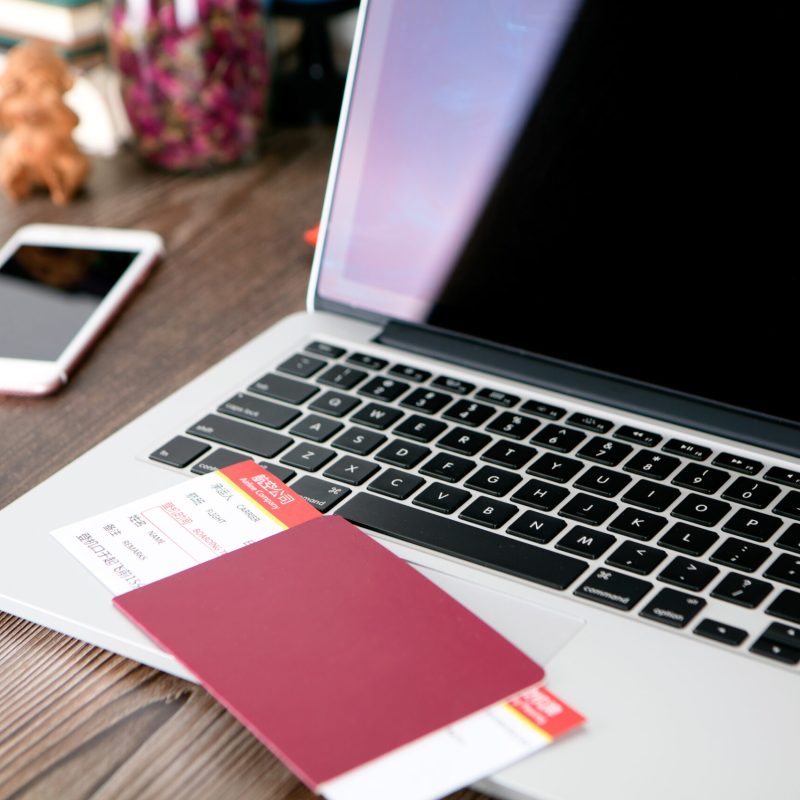
When we travel, we tend to be a little looser about some things than we’d be at home. We’re in a hurry to catch that airplane, we’re not sure where to connect to Wi-Fi safely (but still need to!), or just don’t think about how unsafe a given habit might be.
Videos by TravelAwaits
A little planning ahead, though, can help keep you — and your data — safer when you travel. Avoid these six things that make you vulnerable to hackers when you travel, and you’ll have a more enjoyable trip and return home.

1. You Charge Your Phone In Public
When you’re traveling — whether that’s checking out a new coffee shop near your grandkids’ school or visiting a fancy bookstore in the heart of London — we tend to run out of smartphone charge pretty quickly. Unfortunately, charging your phone in a public space opens you up to hackers.
If you’ve ever plugged your phone into your computer, you’ve probably seen the options of charging, sending data, et cetera. This function is what opens your phone up to hackers from public places.
You can do a few things to avoid this problem:
- Fully charge your phone before leaving your hotel
- Turn off data and battery-draining apps
- Uninstall data usage-heavy apps
- Get a power bank
- Turn your phone off when it’s not in use
- Take pictures with a camera instead of your phone

2. You Log Into Public Wi-Fi Networks
When you’re overseas in particular, it’s extremely tempting to log into public Wi-Fi networks to avoid international data and roaming charges. Unfortunately, that public network opens your computer, tablet, or phone up to all sorts of issues, even if the network in question is at a nicer hotel.
For one, the network isn’t secure by nature. “Public” Wi-Fi means anyone can log in if they have the password. Many public networks don’t even require a password. Hackers can easily hijack your information or infect your device with malware that steals your private data.
The best way to avoid using public Wi-Fi is twofold:
- Grab a portable router that works with your cell service provider
- Wait until you get back to the hotel and can log into a secured network before checking your accounts

3. You Check Your Bank Account Or Pay Bills While Traveling
One of the biggest no-nos in travel is checking your bank statement on a device connected to an open network. If you’re staying with friends, you can use their network, but otherwise, find some other way to check on bank information. There are some pretty nasty hotspots and networks out there that provide hackers with direct access to your banking information the second you log in on your device.
Similar to banking, paying your bills while traveling opens your accounts up to hackers as well. Your service providers, job accounts, et cetera all have your information, meaning when you log in, social security numbers, bank accounts, and credit card information is all available through your phone.
You can avoid this issue by doing a few things:
- Put all bills on automatic payments before you travel
- Ask a trusted family member to pay bills or check accounts for you
- Keep a daily log of all spending while you travel instead of logging in

4. You Use Unfamiliar ATMs
When you’re traveling overseas, it can be risky to carry all the cash you’ve got budgeted for shopping, dining out, and paying bills. But using random ATMs in hotel lobbies or on street corners is risky business.
I once used an ATM in Guatemala that was in an “ATM shop.” If I hadn’t been a college kid traveling with no money, I could have lost far more than I did to the hackers who tried to jack my account. The ATM shop looked legitimate, but I discovered — too late — that it was anything but.
If you need to get cash out, be sure to:
- Only use ATMs at reliable banks and locations backed by legitimate banks
- Research ahead or ask trusted locals which ATMs are safe

5. You “Check In” Or Let GPS Track Your Phone
When we travel, we often let our devices track us. This can be through checking in via Facebook, turning on the GPS to help us find a new shop, or even while we’re out running a new trail. While this is a great way to share our activities and favorite restaurants with friends and family, it’s also an easy way for hackers to keep track of our movements, shopping habits, and more.
If you want to keep track of what you’ve done on your travels and share with others:
- Wait to post anything until after you’ve gotten home
- Use an app or notebook to jot down memories you want to keep and post on social media later
- Get a “junk mail” email account, and use that anonymous account on Yelp or Google from a public computer for those reviews you just have to give in the moment

6. You Use “Soft” Security Questions Or A Single Password For Everything
You’ve probably heard that you shouldn’t use a single password for everything. But when you travel, it’s especially tempting to ignore that precaution. If you can log into all your accounts with a single easily memorized password, you won’t have to worry about not being able to access your Facebook, bank account, phone account, et cetera, right?
Well, when you’re traveling, you can’t easily log into your accounts to check things without exposing your data. Hackers love it when your Facebook and bank account passwords are one and the same. In next to no time, they can apply a single password to any accounts they link to your name and start wreaking havoc.
To protect yourself:
- Use obscure security questions instead of the standards supplied by your bank or credit card company
- Use a complicated password that doesn’t use words linked to your life

You Don’t Have To Be A Victim When You Travel
It’s easy to overlook things like passwords, charging your phone on the go, or logging in to pay a bill you forgot about. But if you create a checklist before your trip and deal with each of these things — like buying a power bank for charging on the go safely — you’ll find yourself less vulnerable to hackers out to steal your information.
